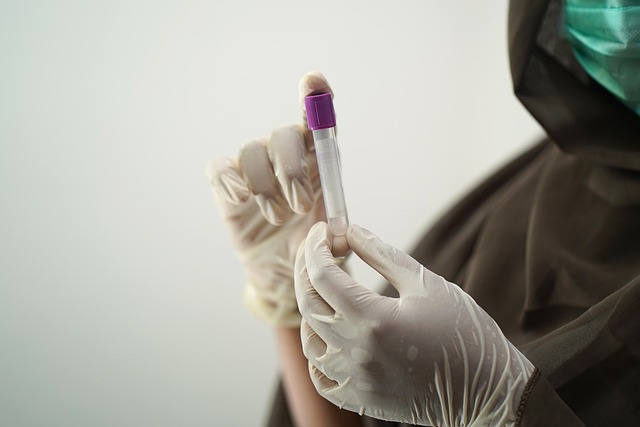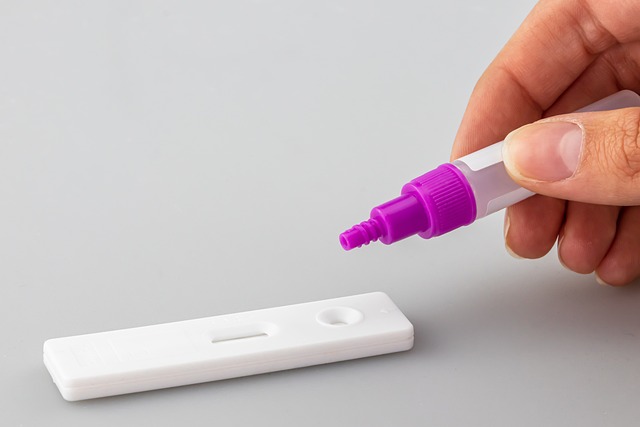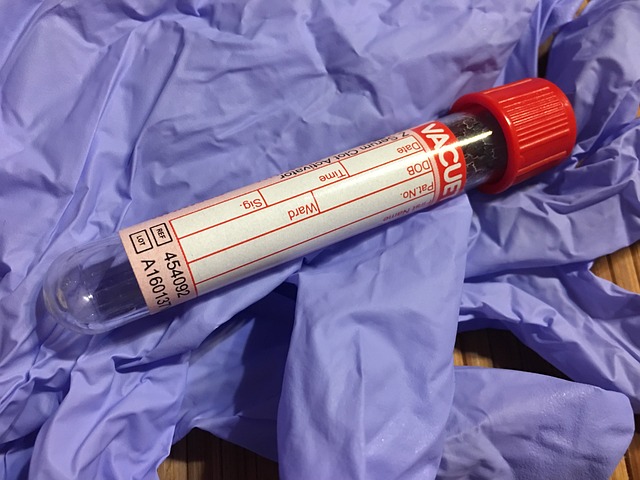Iron deficiency anemia, characterized by low iron leading to issues with hemoglobin and energy metabolism, can cause symptoms like fatigue, weakness, and pale skin. It also affects testosterone production, impacting men's hormonal balance, libido, mood, and muscle mass. In the UK, healthcare professionals utilize blood tests, including measuring serum ferritin, iron, total iron-binding capacity (TIBC), and transferrin saturation to diagnose this condition. The Testosterone Blood Test UK is particularly important as it evaluates reproductive health and overall well-being, especially for men with potential hormonal imbalances. It's crucial for those with symptoms like fatigue or risk factors such as heavy menstrual bleeding or gastrointestinal issues to get tested early. Early diagnosis and treatment are key to preventing complications and restoring health. The UK healthcare system uses blood tests like the Testosterone Blood Test UK as a non-invasive diagnostic tool for monitoring iron deficiency anemia and its impact on testosterone levels, emphasizing the importance of prompt testing and accurate interpretation for effective treatment. The Testosterone Blood Test UK is accessible through the NHS or private services and is integral to understanding the interplay between testosterone and iron metabolism, ensuring nuanced treatment plans that address both potential deficiencies for better patient care and outcomes.
Identifying iron deficiency anemia is pivotal for maintaining health and well-being, a task effectively accomplished through blood tests. This article delves into the significance of these tests in the UK, with a special focus on their role in diagnosing iron deficiency anemia. Additionally, we explore the connection between testosterone blood tests UK and iron levels, shedding light on how this crucial measurement contributes to comprehensive anemia screening. Understanding these aspects is key for individuals and healthcare providers alike to address and manage iron-related health concerns effectively.
- Understanding Iron Deficiency Anemia and Its Impact on Health
- The Role of Blood Tests in Diagnosing Iron Deficiency Anemia in the UK
- A Guide to Testosterone Blood Test UK: Its Connection to Iron Levels and Anemia Screening
Understanding Iron Deficiency Anemia and Its Impact on Health

Iron deficiency anemia is a condition characterized by insufficient levels of iron in the blood, leading to a decrease in hemoglobin and red blood cell count. This can result in a host of health issues, as iron plays a pivotal role in various bodily functions, including oxygen transport and energy metabolism. Symptoms ranging from fatigue and weakness to pale skin and shortness of breath may manifest, signaling the body’s need for iron. Iron is also integral to the production of testosterone; hence, its deficiency can impact not only red blood cell formation but also hormonal balance. In men, low testosterone levels can lead to decreased libido, mood changes, and reduced muscle mass, underscoring the importance of maintaining optimal iron levels.
In the UK, healthcare providers utilize blood tests as a primary tool for diagnosing iron deficiency anemia. These tests measure serum ferritin, iron, total iron-binding capacity (TIBC), and transferrin saturation to assess iron stores in the body. The Testosterone Blood Test specifically measures testosterone levels, providing insight into both reproductive and overall health. It’s crucial for individuals experiencing symptoms of anemia or those with risk factors such as heavy menstrual bleeding, gastrointestinal conditions affecting iron absorption, or dietary deficiencies to consider these tests. Early detection and intervention are key to managing the condition effectively, preventing complications, and restoring health and vitality.
The Role of Blood Tests in Diagnosing Iron Deficiency Anemia in the UK

In the United Kingdom, blood tests play a pivotal role in diagnosing iron deficiency anemia, offering a non-invasive and efficient method for healthcare professionals to assess iron levels and overall health. The haemoglobin test, meanwhile, measures the amount of haemoglobin in the blood, which can indicate anemia. A complete blood count (CBC) provides a comprehensive overview of various blood components, including red blood cell count, hemoglobin, and hematocrit levels. Additionally, serum ferritin levels are a key indicator of iron stores within the body. Iron deficiency is suspected when these ferritin levels fall below a certain threshold. The Testosterone Blood Test UK, although primarily used to assess testosterone levels in men for conditions like hypogonadism, can incidentally provide information on iron status as both testosterone and iron are measured within the same sample. This multifunctional nature of the blood test not only streamlines the diagnostic process but also ensures a comprehensive approach to patient health management. Iron deficiency anemia is a common condition, and timely diagnosis through these tests is crucial for effective treatment planning and patient recovery in the UK. The identification of iron deficiency anemia at an early stage can significantly improve health outcomes by preventing complications associated with chronic anemia, such as fatigue, weakness, and increased risk of infection. It is imperative for individuals experiencing symptoms suggestive of anemia to consult healthcare providers who can order the appropriate blood tests and interpret the results accurately.
A Guide to Testosterone Blood Test UK: Its Connection to Iron Levels and Anemia Screening

In the UK, assessing iron deficiency anemia often involves a comprehensive approach that includes the testosterone blood test, particularly for male patients or those undergoing hormonal evaluations. This dual assessment is significant because testosterone levels can influence iron metabolism and vice versa. A low testosterone level might be indicative of underlying conditions such as hypogonadism, which can also affect iron homeostasis. Conversely, iron deficiency or anemia can impact testosterone production, creating a feedback loop that requires careful medical attention. The Testosterone Blood Test UK is a precise diagnostic tool that measures the amount of this critical hormone in the bloodstream, offering valuable insights into overall health and potential deficiencies. This test is readily available through the NHS or private healthcare providers across the UK and is typically conducted as part of a broader health screening or when specific symptoms suggest a hormonal imbalance.
Understanding the relationship between testosterone and iron levels is crucial for accurate diagnosis and effective treatment plans. Iron deficiency anemia can lead to fatigue, weakened immune function, and other health issues that may mask or be masked by symptoms of low testosterone. Similarly, conditions causing low testosterone might manifest with symptoms similar to those seen in iron-deficient states. The integration of the Testosterone Blood Test UK into anemia screening protocols ensures that healthcare providers can discern between these conditions and address both hormonal and hematological health concerns comprehensively. This holistic approach is essential for achieving optimal patient outcomes and fostering well-being, especially in demographics where testosterone levels are a critical factor in overall health.
In conclusion, iron deficiency anemia is a prevalent health concern that can significantly impact one’s well-being. The utility of blood tests in diagnosing this condition within the UK context is paramount, offering precise and efficient means for early detection and treatment. Moreover, understanding the interplay between iron levels and testosterone, as explored in the context of a Testosterone Blood Test UK, has become increasingly significant, particularly given the high prevalence of both conditions among men. Regular screening and awareness of the symptoms can lead to timely diagnosis and effective management, thereby enhancing overall health outcomes and quality of life for those affected by iron deficiency anemia or related disorders.
